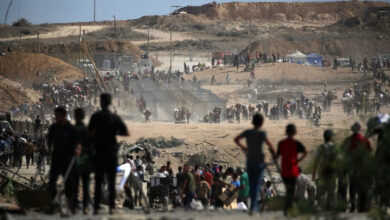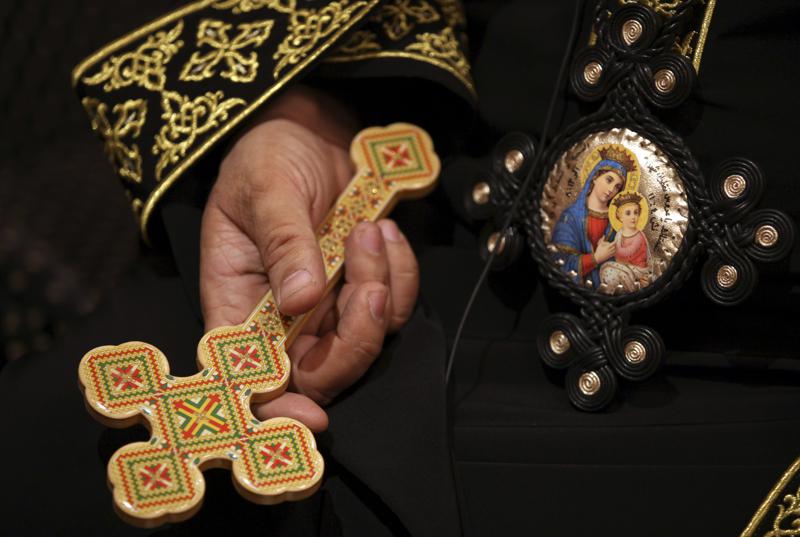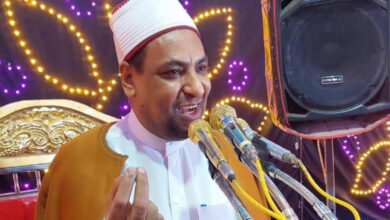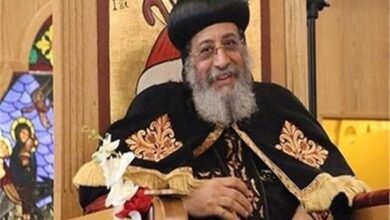It was an extraordinary move by members of Maspero Coptic Youth Union (MCYU) to reject calls by church leaders to end their first sit in against burning a church in the village of Sol in the Atfeeh area in March 2011. It was equally extraordinary for Rafeek Farouk, a member of the group Copts 38, to confront a church leader inside the Abbasseya Cathedral in protest of the church's restrictive divorce laws.
In 18 days, Egyptians managed to topple a decades-long dictatorship, but it seems that it will take years until there is an end to the control of religious institutions over the social and political aspects of their lives. A battle over the identity of the new Egypt is ongoing, and Copts are struggling to secure their future as the forces of political Islam ascend to power.
Immediately after the fall off Mubarak, Egypt bore witness to a wave of political coalitions echoing the new political awakening, and Copts were no exception. But Coptic movements are having a hard time in presenting an alternative to the dominance of the church over the lives of millions of Copts.
The ancient Coptic Church, long the guardian of Copts' political aspirations, contends with new lay groups that are attempting to mobilize Copts in support of causes that are political and personal — and even sectarian.
The youth of Maspero
MCYU represents a challenge to the church's involvement in politics, while Copts 38 openly criticizes the church's hegemony over the religious and personal status of Copts.
The group’s members say they were the first to defy the church's orders to the Coptic community not to participate in the 25 January protests.
"We are a group of politically engaged Copts who were working on the Coptic issue even before the revolution, but in an unorganized way,” the union’s general coordinator, Hani Ramsis, told Egypt Independent.
In March 2011 MCYU refused to end their sit in before of the Maspero state television building, despite pressure from the Church. Their insistence on holding their ground led to a decision to renovate the church in Atfeeh that was burned down in sectarian clashes.
Yet, the group’s overarching objective is to attract millions of politically apathetic Copts to the political sphere, challenging the church's role.
After the March 2011 sit-in, MCYU managed to mobilize more and more Copts for street demonstrations, reaching a peak in October 2011 in the biggest Coptic march from the district of Shubra to Maspero, where a massacre took place. Soldiers left 28 protestors dead, including 23 Copts, and more than 200 injured.
The massacre marked a decline in MCYU's mobilization. Sectarian incidents of Copts who were forcibly evicted from their homes in Amreya, Alexandria and in Dahshur had witnessed little or no response by the union.
Yet Ramsis denies that the past year has seen a decline of activity. “We are part of the revolutionary movement, and our ups and downs are directly related to the revolution's successes and failures,” he said.
Copts 38
The challenges facing Copts 38 group are even more complex. Demanding a change in the restrictive divorce laws of the Coptic Church, Copts 38 are mobilizing for the right to civil marriage, and the right to remarry after divorce.
Observers believe that Copts 38 represents a relatively small group that does not find mass appeal within the Coptic community.
“The church is practicing a kind of religious and political thuggery,” Farouk exclaims.
Copts 38's efforts to find a constitutional solution to their difficulties, as an inclination inside the Constituent Assembly tasked with drafting the constitution, seems to appease the Church and its followers over the interests of a small group of Copts seeking civil marriage laws.
The Christian Brotherhood
Meanwhile, some Coptic activist groups exist to oppose the growing influence of Islamist groups in Egyptian political sphere.
The Christian Brotherhood is the best known example. The Coptic group aims to attract Coptic youth to organize in a manner similar to the large Islamist movement, but without a supreme guide. Instead, the group has its own "Godfather."
In its first statement, the group said that it would not be a registered organization, echoing the stance of the Brotherhood which is not legally registered as an organization; hence its activities and sources of funding are not under state oversight.
The group claims it intends to take political, social, and religious roles within the Coptic community, as well as documenting incidents of sectarian tensions and attacks on Copts. Yet, unlike the MCYU, they have not engaged in any activity with other forces to press Coptic interests, and seem to heavily stress both their Christian identity and the fear of organized Islamism.
Observers say that mobilization on communal grounds would not be to the advantage of a numerical minority such as the Copts. During the parliamentary elections, Islamist groups swept the board.
An opinion poll conducted by Gallup Center for Muslim Studies prior to the presidential elections in June showed that 15 percent of Egyptians want a complete separation between religion and the state, while another 15 percent showed a desire to fully implement Sharia. The remaining 70 percent adopted a moderate approach towards the relationship between religion and the state.
More religious polarization, observers argue, will be more favorable for Islamist movements, to which most of the 70 percent will be attracted, as many mainstream Egyptian voters perceive secularism as a threat to their religious identity.
Middle East historian and expert in Coptic issues Kurt Werthmuller told Egypt Independent that he expects that any of these Coptic groups will find it difficult to lead a mass movement within the Coptic community.
"My pessimism is due to the fact that each of these groups represents a very specific niche among a very specific class of politically active Copts, not among most average Copts throughout the country," he explained.
In addition to the narrow representation of these groups among the major Coptic population, the church's strong political role seems to be a point of agreement not only inside the Coptic community, but within the state as well.
"Copt-state relations take place in what we might call a citizenship vacuum; rather than deal with all Egyptians as equal and individual citizens, the state has traditionally conceived of and consistently treated the Copts as a separate community," Werthmuller says.
Islamist movements, including the Muslim Brotherhood and Salafis, look set to take a similar approach in power.
Members of the Constituent Assembly look set to amend Article 2 of the constitution in a way that will preserve the right of non-Muslims to resort to their own religious jurisdiction in matters of marriage. Such an amendment would allow the church to further tighten its grip over Copts spiritually and politically.
"This certainly excludes any sort of alternate civil code for personal status, such as the sort for which Copts 38 has advocated," Werthmuller says. “Personal status” issues concern marriage, divorce, family law and inheritance.
A new Coptic citizenship?
For Coptic groups to attract a solid mass movement that can challenge the dominance of the church over Coptic politics, new movements need to work on a long term set of demands that can enjoy mass consensus among Copts across the socioeconomic spectrum.
"I strongly believe that the demand for a fully-realized framework of citizenship would hold the most promise in this regard, in contrast to the Ottoman millet-style framework that seems to dominate the Constituent Assembly's discussions vis-à-vis non-Muslims at the moment," Werthmuller argues. Under the Ottoman Empire’s millet system, religious minorities would resort to their own laws and courts in “personal” matters.
Such a framework, he says, would need to steer away from a direct challenge to the church which plays a great spiritual role among the Coptic community, as well as avoiding sectarian overtones that will not be in favor of the Coptic numeric minority.
Coptic movements should also, Werthmuller contends, push for this framework in wider non-Coptic circles, especially the non-Islamist parties that challenge the dominance of the Islamic movements over politics. Including Coptic citizenship frameworks on the national agenda of secular forces will make these demands look less sectarian in the eyes of the Egyptian public.
Thus, Coptic groups must act as the connection between the politically apathetic Copts and the wider spectrum of Egyptian politics. Presenting these demands on such basis will pressure the ruling Islamic groups to look at Coptic issues as national demands than sectarian-specific dilemmas, Werthmuller believes.
“Coptic groups need to understand that mobilizing on a sectarian basis will not bring them support in the Coptic community, which is already suffering from deep sectarian strife,” the chief editor of the Coptic newspaper Watany, Youssef Sedhom, told Egypt Independent.
“Coptic movements managed to send a clear message to the church that intervening in politics should end. Yet, it will take time for these movements to fill the vacuum that the church will gradually leave in the future,” he added.
Werthmuller suggests a third route to integrate Muslims and Copts, based on a universal citizenship framework for all Egyptians, regardless of religious identity.
“[The third route should be through mobilizing] grassroots and state-level work to change the perceptions of more and more of their fellow citizens who belong to the Muslim majority that they, too, have an integral, inclusive, and rightful place alongside them — not separate from them — in their beloved Egypt," he says.




